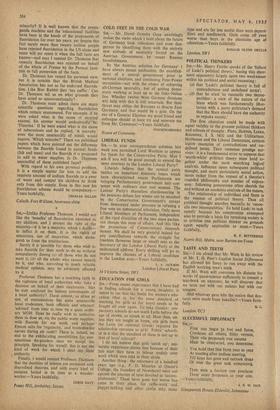POLITICAL THINKERS Sia,—Mr. Henry Fairlie speaks of the 'failure of
Laski's political theory,' basing this state- ment apparently largely upon two weaknesses within his political and social reasoning: (a) that 'Laski's political theory is full of contradictions and undefined terms'; (b) that he tried 'to reconcile two incom- patibles: a view of the nature of the State which was fundamentally liber- tarian with a party politician's demand that the State should have the authority to remake society.'
The first objection could be made with equal validity to the greatest political thinkers and schools of thought : Plato, Hobbes, Locke, Rousseau, J. S. Mill and the Utilitarians, Hobhousc and the Liberal Democrats, contain legion examples of contradictions and un- defined terms. Their immense prestige sur- vives: it is a fundamental error to suppose that 'worth-while' political theory must hold to- gether under the most searching logical analysis. Influence upon subsequent political thought, and more particularly social action, stems rather from the impact of a theorist's rounded philosophy and manner of expres- sion : following generations often cherish the end without an academic analysis of the means.
The relationship of individual and State is the essence of political theory. Thus all political thought searches basically to 'recon- cile two incompatibles.' To hold Laski to task merely because his compromise attempted also to provide a basis for remaking society is to criticise one political thinker on grounds again equally applicable to most.—Yours faithfully,
Norris Hill. Moira. near Burton-on-Trent










































 Previous page
Previous page